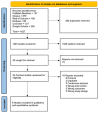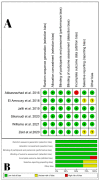The Effect of Vitamin D Supplementation on the Severity of Symptoms and the Quality of Life in Irritable Bowel Syndrome Patients: A Systematic Review and Meta-Analysis of Randomized Controlled Trials
- PMID: 35807798
- PMCID: PMC9268238
- DOI: 10.3390/nu14132618
The Effect of Vitamin D Supplementation on the Severity of Symptoms and the Quality of Life in Irritable Bowel Syndrome Patients: A Systematic Review and Meta-Analysis of Randomized Controlled Trials
Abstract
Irritable bowel syndrome (IBS), a gastrointestinal disorder affecting 7-12% of the population, is characterized by abdominal pain, bloating, and alternating bowel patterns. Data on risk and protective influences have yielded conflicting evidence on the effects of alternative interventions, such as vitamin D. This review focuses on the effects of vitamin D on IBS. A systematic review and meta-analysis considered all articles published until 4 April 2022. The search for randomized controlled trials assessing vitamin D efficacy in IBS with outcomes, primary (Irritable Bowel Severity Scoring System (IBS-SSS)) and secondary (IBS quality of life (IBS-QoL) and serum level of calcifediol (25(OH)D)), was performed on six databases, Google Scholar, Web of Science, SCOPUS, EMBASE, PubMed (MEDLINE), and Cochrane Central Register of Controlled Trials. We included six trials with 616 patients. The pooled analysis found no difference between vitamin D and placebo in improving IBS-SSS (MD: -45.82 with 95% CI [-93.62, 1.98], p = 0.06). However, the pooled analysis favored vitamin D over placebo in improving the IBS-Qol (MD: 6.19 with 95% CI [0.35, 12.03], p = 0.04) and serum 25(OH)D (MD: 25.2 with 95% CI [18.41, 31.98], p = 0.00001). Therefore, further clinical trials are required to reach clinically applicable and generalizable findings.
Keywords: alternative intervention; calciferol; confidence interval; flow chart; gastrointestinal disorder; heterogeneity; mean difference; placebo; protocol; random.
Conflict of interest statement
The authors declare no conflict of interest.
Figures





References
-
- Spiller R.C., Jenkins D., Thornley J.P., Hebden J.M., Wright T., Skinner M., Neal K.R. Increased Rectal Mucosal Enteroendocrine Cells, T Lymphocytes, and Increased Gut Permeability Following Acute Campylobacter Enteritis and in Post-Dysenteric Irritable Bowel Syndrome. Gut. 2000;47:804–811. doi: 10.1136/gut.47.6.804. - DOI - PMC - PubMed
-
- Camilleri M., Lasch K., Zhou W. Irritable Bowel Syndrome: Methods, Mechanisms, and Pathophysiology. The Confluence of Increased Permeability, Inflammation, and Pain in Irritable Bowel Syndrome. Am. J. Physiol. Gastrointest. Liver Physiol. 2012;303:G775–G785. doi: 10.1152/ajpgi.00155.2012. - DOI - PubMed
Publication types
MeSH terms
Substances
LinkOut - more resources
Full Text Sources
Miscellaneous

